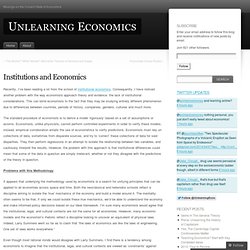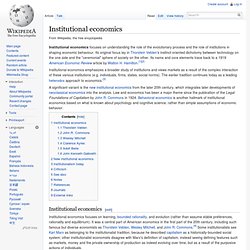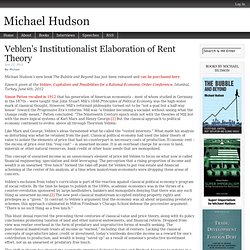

Institutions and Economics. Recently, I’ve been reading a lot from the school of institutional economics.

Consequently, I have noticed another problem with the way economists approach theory and evidence: the lack of institutional considerations. This can blind economists to the fact that they may be studying entirely different phenomenon due to differences between countries, periods of history, companies, genders, cultures and much more.
The standard procedure of economists is to derive a model ‘rigorously’ based on a set of assumptions or axioms. Institutional economics. Institutional economics focuses on understanding the role of the evolutionary process and the role of institutions in shaping economic behaviour.

Its original focus lay in Thorstein Veblen's instinct-oriented dichotomy between technology on the one side and the "ceremonial" sphere of society on the other. Its name and core elements trace back to a 1919 American Economic Review article by Walton H. Hamilton.[1][2] Veblen’s Institutionalist Elaboration of Rent Theory. Michael Hudson’s new book The Bubble and Beyond has just been released and can be purchased here.

Speech given at the Veblen, Capitalism and Possibilities for a Rational Economic Order Conference, Istanbul, Turkey, June 6th, 2012 Simon Patten recalled in 1912 that his generation of American economists – most of whom studied in Germany in the 1870s – were taught that John Stuart Mill’s 1848 Principles of Political Economy was the high-water mark of classical thought. However, Mill’s reformist philosophy turned out to be “not a goal but a half-way house” toward the Progressive Era’s reforms.